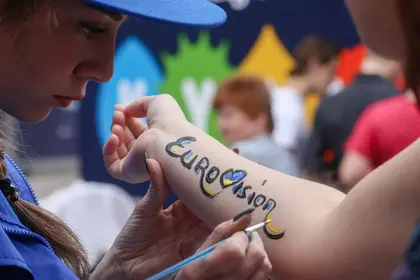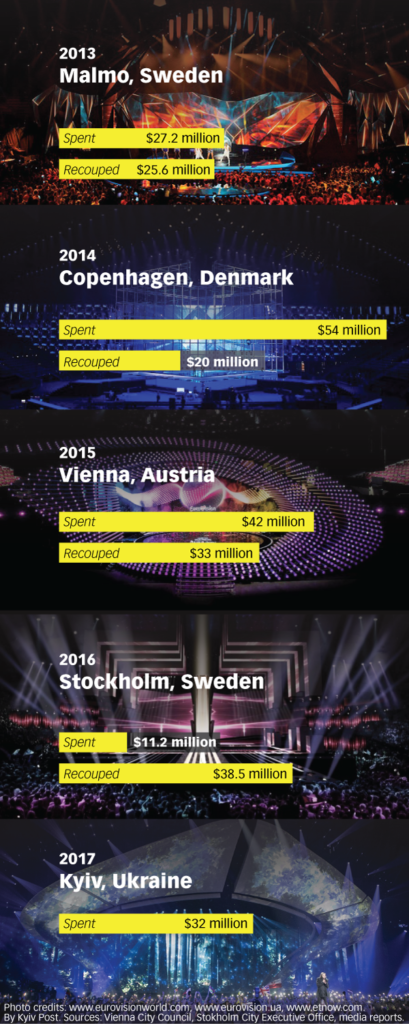Eurovision isn’t all about songs. It’s about business, too.
Initially, it was to have cost Ukraine about $24 million to host the show.
JOIN US ON TELEGRAM
Follow our coverage of the war on the @Kyivpost_official.
Instead, Ukraine’s taxpayer-funded national broadcaster is spending $32 million on the contest – an eye-popping sum for a country at war, and almost three times the amount spent by last year’s Eurovision host city, Stockholm, Sweden.
After Eurovision preparations got under way last September, the team of event organizers had expected revenues from ticket sales and advertising to be worth $7.4 million.
However, the broadcaster’s management later put its foot down, saying that all the money earned from Eurovision had to be spent on Eurovision. The budget was increased to $32 million, with the $7.4 million added to the expenses line, causing part of the organizational team to quit on Feb. 13.
Now the only way for Ukraine to get some money back from hosting the event is from an increase in revenues from tourism during the event and after.
Kyiv city officials predict that every Eurovision tourist will spend at least $550 during the contest. As Ukraine expects some 20,000 visitors to come for Eurovision, the country might recoup some $10.8 million through tourism spending – barely a third of outlay.
Compare that to Stockholm, which says it saw at least 38,000 visitors to Eurovision, bringing in $38.5 million in revenues. During the last three contests in Malmo, Copenhagen and Vienna, between 30,000 and 40,000 people traveled to the host cities.
Spending money
Head of the public broadcaster Pavlo Hrytsak, who took over the organization of the event after the original team quit in February, promised to save as much money from the event budget as he could. According to him, if there is any money left over from the $32 million Eurovision pot, the government will decide what to do with it.
However, spending has not been modest so far.
Almost $37,700 was allocated for the outfits of the three Eurovision hosts, which were made by the Indposhyv atelier. According to the ProZorro online procurement platform, the atelier’s work was worth $23,270.
Indposhyv’s founder, Kateryna Vozianova, said the excess sum was charged because the eight sets of attire, including suits, shirts, accessories and shoes, were ordered on a tight deadline, and confirmation of the order was received from the organizers only a few weeks before the first semi-final.
A similar amount, $38,460, is to be paid to the Crimean Tatar singer Jamala, who will perform three songs during this year’s show. Her producer says she will earn nothing, as the money will only cover the cost of her performances. The 2004 winner, Ruslana, the second-ever Ukrainian entry in Eurovision, will perform for $15,153.
In the meantime, an aide to Ukrainian lawmaker Andriy Denysenko – Kyrylo Tymoshenko – will earn some $77,000 from making video presentations for each of the show’s contestants, according to the documents obtained by the Nashi Groshi investigative website.
Ticket scam
And lavish spending might not be the organizers’ biggest problem.
The sale of tickets, a process costing organizers $2.6 million, has lacked transparency. After Concert.ua won a tender to become the official distributor of the nearly 70,000 Eurovision tickets, the Antimonopoly Committee of Ukraine on Feb. 6 declared the agreement non-transparent, and demanded that another tender be held.
However, public broadcaster signed a contract with Concert.ua anyway for the symbolic sum of Hr 1.20 – a contract value much lower than the threshold for which a tender must be held. Concert.ua will earn around $158,500 from the deal, as the servicing fee, paid by the customer, is 6 percent of the tickets’ total value.
Problems, problems
Oleksandr Kharebin is one of the former executive producers of the Eurovision who quit in February. He said that one of the reasons the former Eurovision organizers quit was that the terms of the tenders were sabotaged, delaying the preparations for the contest.
While the public could oversee procurements via the ProZorro online procurement platform, Kharebin said that some of the tenders were held under a simplified procedure that gave room for shady backroom deals. The National Television Company said they were holding all the tenders transparently, but didn’t disclose any details.
The national broadcaster didn’t respond to a Kyiv Post’s request for the number of tenders held under the simplified procedure by the time of the publication.
One scandalous tender that did make it to the news was one concerning seats for the Eurovision audience. Germany’s Nussli construction company initially won the tender to set up some 9,200 seats and 50 commentator’s booths, bidding 1 million euros.
But the national broadcaster later annulled the agreement, saying the company didn’t meet Ukrainian construction regulations, Nussli officials later told the Radio Free Europe/Radio Liberty. Instead, a Lviv-based company built less than 7,000 seats and no booths for around $900,000 The company is allegedly linked to Hrytsak, although he denies this.
Attracting tourists
Ukrainian officials hope that hosting Eurovision, with all of its associated sports events, festivals and tourist attractions, will give Ukraine a much-needed chance to boost its reputation and image.
In Sweden, seven out of ten visitors said they were likely to return within a year, bringing some extra $7.5 million to the budget, according to the communications strategy team for Eurovision 2016 in Stockholm.
Kyiv officials are hoping for a similar payback.
“Our first goal is not financial profit,” Oleksiy Reznikov of the Kyiv City Administration said. “We’re working on the image of the city, and the country.”
Kyiv Post staff writer Nataliya Trach contributed reporting to this story.
You can also highlight the text and press Ctrl + Enter





